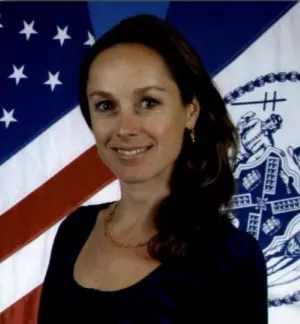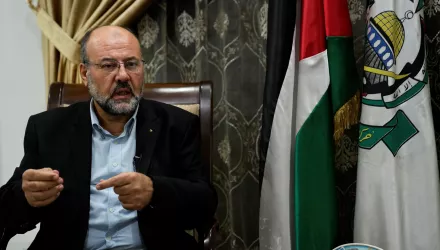Overview
Long relegated to chasing down art thieves and forgers, Interpol has found new relevance—and enjoyed surprising success—leading the global police effort to track down terrorists
ON FEB. 3, 23 prisoners, including one of the masterminds of the 2000 USS Cole bombing as well as 12 other convicted Al Qaeda members, escaped from a military intelligence detention facility in Yemen, tunneling 460 feet before emerging to freedom. Soon after the escape, Ronald Noble, the secretary general of the international police organization Interpol, announced that the escape "cannot be considered an internal problem for Yemen alone." As Noble pointed out, the terrorists pose a clear and present danger to all countries. Interpol—the world's only global crime-fighting organization and the second largest international institution after the UN—would immediately mobilize law enforcement officers in its 184 member states to find and detain the men wherever in the world they may have fled.
That the manhunt is being led by Interpol, an outfit seemingly more fit for the plodding pursuit of art thieves and forgers than tracking down terrorists, may not inspire much confidence. For most of its history—it's been around since 1923—Interpol has been an almost laughably lethargic European bureaucracy, perhaps as famous for its role chasing the fictional super-criminal Carmen Sandiego than its real-life crime-fighting. But with the growth of borderless threats like terrorism and the illegal trafficking of drugs, weapons, and humans, Interpol has become newly relevant. And thanks to a change in leadership and the benefits of new technology, it has also in recent years gotten better at its job: connecting law enforcement agents across the globe to each other and to the vast quantities of crime-related data it has amassed.
Interpol still rarely makes headlines, but in the last half-decade it's frequently been the puppet master behind some stunning feats of international law enforcement. Last year alone, Interpol's efforts led to some 3,500 arrests, including the capture of one of the world's most wanted war criminals and assailants in the Madrid train bombings and London subway attacks.
These efforts have earned Interpol an unlikely coalition of supporters, from civil libertarians to hawkish conservatives to liberal internationalists. Interpol's goal of fighting international crime is of course a relatively uncontroversial one, but given that the means by which it does so can entail the sharing of sensitive information between countries like the US and countries like Syria, Columbia, or Iran—Interpol member states all—such widespread enthusiasm is surprising. Even the Bush administration, hardly known for its embrace of multilateralism or international law, has supported Interpol. President Bush singled it out in two official addresses; John Ashcroft was the first US attorney general to pay a visit to its headquarters in Lyon, France; and the US has backed a 50 percent increase in Interpol's budget over the past five years.
In those five years, the organization has become a key player in the global war on terror—and has provided a model for a different way of thinking about, and executing, international law.
Created after World War I, Interpol has historically been cloaked as much in obscurity as intrigue. After a brief takeover by the Nazis during World War II, Interpol sat out the next few decades on the sidelines of the Cold War, due to its sluggish institutional metabolism and its strict avoidance of crimes that could be considered political (terrorism, for one). Ronald Noble arrived in Lyon to find a global police organization that was only open on weekdays, from 8 to 6. Red Notices, the global equivalent of All Points Bulletins for most-wanted criminals, were sent via third class mail, often taking months to arrive. This was in 2000.
Noble, a former US federal prosecutor who served in high-level positions in the Department of Justice and the Treasury and who is accustomed to working 16-hour days, is the first American secretary general. To a large degree, it is he who has driven Interpol's transformation from what has been described as "a retirement colony for police officers," to what it is today.
Even in 2000, Noble recognized that Interpol would become obsolete unless it took on terrorism as part of its mandate. He believed the agency's old policy of avoiding terrorism was grounded in a misunderstanding of what terrorism is. "Nobody will deny that there are political aspects to terrorism," he says, "but terrorism is first and foremost a crime. How can police, and thus Interpol, not be involved, or indeed take the lead in fighting terrorism?" If there had been any residual doubts, the destruction of the World Trade Center dispensed with them. Since Sept. 11, Noble attests, "the lights have never been turned off at Interpol."
As it happened, Interpol was well-suited for counterterrorism work. The agency doesn't have secret agents, and it can't make arrests—it is, and always has been, an investigative support network that collects, analyzes, and disseminates information to law enforcement agents in its member countries. Interpol specializes in connecting the dots—which, as the 9/11 Commission noted, is the key to fighting terrorism.
The agency has only gotten better at connecting the dots as it has learned to exploit recent advances in information technology. In 2002, Interpol introduced a state-of-the-art electronic global police communications system called I-24/7. The new system lets member countries instantly send alerts about terrorists, fugitives, missing persons, or weapons threats around the world and provides access to databases containing millions of criminal records, DNA profiles, fingerprints, and intelligence reports.
Technology is of course only as useful as the people who use it, but the new system has already proven its value. In December, it helped end a four-year manhunt for one of the world's most wanted war criminals, the former Croatian Army General Ante Gotovina, at a luxury resort in the Canary Islands. Gotovina checked into his hotel with a fake Croatian passport that showed up on Interpol's new international database of stolen travel documents. By the most recent count, there are more than 10 million travel documents in the database, as well as profiles of over 9,300 suspected terrorists, over 250,000 photographs of child sexual abuse and pornography, and over 30,000 images of stolen works of art.
I-24/7 allows law enforcement agents based thousands of miles apart to coordinate international interdictions. "When you have a cagey, crafty adversary who can adapt using off-the-shelf commercial technology, having a system that allows the 24/7 movement of information can help the government adapt," says Glen Ware, managing director of the risk consulting firm Diligence LLC.
Red Notices now take hours, instead of months, to be distributed. Gotovina's arrest in December was requested by a Red Notice, and according to the FBI, Red Notices recently aided in the capture of Aswat Haroon Rashid—the British terrorism suspect who is believed to have been the mastermind of the London bombings—and Oussama Kassir, a Swedish terrorism suspect who calls himself a hitman for Osama Bin Laden. Since 2000, the overall number of arrests made on the basis of Interpol alerts and notices has increased by 600 percent.
While the power and utility of such a system seems undeniable, there are concerns about abuse. Douglas McNabb, an attorney with the international criminal defense firm McNabb Associates, questions the wisdom of sending classified information to Lyon. "Some of the member countries are the very ones you don't want to see it," he says. Depending on the hands into which it falls, information could be as easily used to tip off criminals as to bring them to justice. It's also not at all clear that law enforcement agents in Cuba or Iran have the same understanding regarding standards of evidence—or, for that matter, what constitutes a crime in the first place—as law enforcement agents in the US.
Yet across the political spectrum, experts seem relatively unconcerned about the potential for abuse. "The people who are involved in Interpol's activities know what they're getting into, and there are a lot of things that they won't give to Interpol," says James Carafano, senior fellow at the Heritage Foundation, a conservative think tank. "But if you're trying to get out information about particular criminals and spread it to other countries, it works great." Ware agrees. "Interpol has always been known as very conservative in this domain," he says. "They are measured in their judgment."
For as much as it stresses access and inclusiveness, Interpol intentionally leaves the decision-making and action-taking in the hands of its member countries. Each country "owns" the information it makes available to the system, and it can choose exactly who sees what. Noble points out that "the US regularly sends information to Interpol where Iran is excluded, for instance, and Iran can send information where the US is excluded." Such selectivity, he says, is par for the course among law enforcement agencies: "Does the FBI share all of its information with Interpol? Heck no. Does it share all of its information with other national and local law enforcement agencies? Heck no."
Member countries seem to trust Interpol to safeguard the information they send it. What's more, there have been some surprising acts of global stewardship that suggest political lines of demarcation don't always apply in the law enforcement context. Noble likes to point out that "Libya was the first country in the world to seek the arrest of Osama Bin Laden"—in connection with terrorist attacks he'd helped facilitate there—"at a time when Libya was an archenemy of the US." The first country to request a Red Notice for Al Qaeda member Abu Musab al-Zarqawi? Algeria.
Interpol seems to be the international organization everyone can agree on. Liberals appreciate its multilateral approach, conservatives its respect for sovereignty. "Interpol isn't making policy; it isn't telling people what they can and can't do," says Carafano. "It doesn't try to supersede the sovereignty of states; it enhances sovereignty—by making strong states stronger."
Above all, Noble says, "Interpol is an organization that was created by police and aims to serve police." Peter Andreas, coauthor of the forthcoming book "Policing the Globe: Criminalization and Crime Control in International Relations," agrees. "To an underappreciated degree there's an international law enforcement subculture," he says. "A cop is a cop is a cop." It may not get much media or political attention, but Andreas believes "there's a remarkable amount of international law enforcement cooperation going on."
In this way, Interpol is a prime example of what Anne-Marie Slaughter, dean of Princeton's Woodrow Wilson School of Public and International Affairs, describes as a "transgovernmental network," in which government officials who share a common professional orientation cooperate with one another across borders on a voluntary, informal basis.
What makes transgovernmental networks distinct as a model of international law, she says, is that they're "more flexible, faster to establish, develop, and reform, and much less bureaucratic" than institutions like the UN or the WHO. By bringing together officials whose allegiance to their profession can be greater than their allegiance to a particular nationality or political party, Interpol promotes multilateralism. But by providing them with the tools to cooperate without demanding that they conform, Interpol respects sovereignty. Or as Massachusetts state trooper Frank Saunders puts it, "we utilize Interpol when we need it; they utilize us when they need us."
Rebecca Ulam Weiner is a fellow at the John F. Kennedy School of Government.
Weiner, Rebecca. “To Protect and Serve the World.” The Boston Globe, February 12, 2006
The full text of this publication is available via The Boston Globe.



